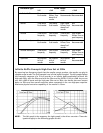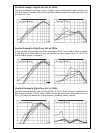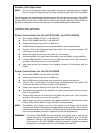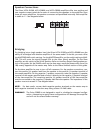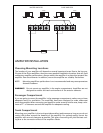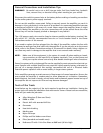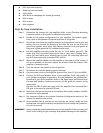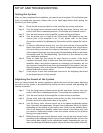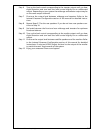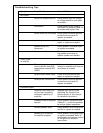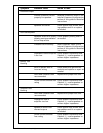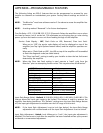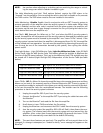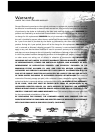
APPENDIX—PROGRAMMABLE FEATURES
The following listing are ESP
®
-2 features that can be programmed or accessed by your
installer to customize or troubleshoot your system. Factory default settings are shown in
bold.
NOTE: The Bitwriter
®
must have software version 2.3 or above to access the amplifier fea-
tures menu.
NOTE: A setting marked “Reserved” is for future development.
Turn On Delay - 0.75, 1.25, 1.75, 2.25, 2.75, 3.25 seconds. Delays the amplifier turn-on when
the head or source unit is turned on. This eliminates any annoying pops or noise during
power up from the head or source unit from feeding through to the amplifier.
Service Code Display - OFF, Flash Code on LED, Reserved, Clear Last Fault.
When set to “Off” the service code display will not be displayed on top of the
amplifier (see Top Light Options feature below) and the amplifier operates nor-
mally.
When set to “Flash Code on LED”, the LED on top of the amplifier will be enabled
to flash the diagnostic code (see table below).
The “Clear Last Fault” setting is used by your installer to clear the last fault event
detected by the amplifier.
NOTE: When the Clear Last Fault setting is used, execute a “read” cycle from the
Bitwriter
®
prior to attempting further writes. This resynchronizes the Bitwriter
®
.
Input Gain Range (Volts) - Default, 0.15–0.50 V, 0.50–1.00 V, 1.00–3.00 V, 3.00–5.00 V. This
feature allows the input gain range to be limited. This feature is useful to prevent the
amplifier from being overdriven. The “Default” setting turns the Input Gain Range feature
off, the input gain adjustment is settable over the full range of the control.
NOTE: If the Input Gain Adjustment is set to Lock (see below), the Input Gain Range
adjustment will not be altered until the Input Gain Adjustment is set to Unlock.
Input Gain Adjustment - Unlock, Lock. When set to “Lock”, the input gain adjustment is
disabled. This can be set to lock after the amplifier has been installed and set up to prevent
accidental or unwarranted adjustment.
ESP
®
-2 Status Indicator Mode
Solid Illumination Normal Operation
Flashing Turn On delay or TX learn
Flashing Slowly Thermal shutdown
Flashing Rapidly Overcurrent
Slow Flash (50% duty cycle) Overvoltage
Slow Flash (mostly off) Under-voltage
Off Amplifier Off
Flashing Arm/Valet received
Flashing Rapidly Amplifier in Anti-theft/Valet
Flashing Amplifier armed
20
© 2005 Directed Electronics, all rights reserved



